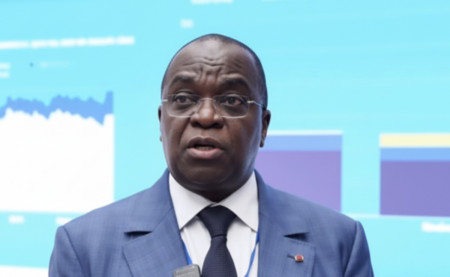(Business in Cameroon) – Cameroon’s Minister of Finance, Louis Paul Motaze, has outlined the country’s fiscal priorities and reform agenda following the conclusion of two International Monetary Fund (IMF) programmes. Speaking in Washington, D.C., on the sidelines of the IMF and World Bank Annual Meetings held from 13 to 18 October 2025, Motaze said discussions focused on tax reform, digitalisation, and future financial cooperation, while reaffirming Cameroon’s commitment to sustaining economic reforms and broadening its fiscal base.
According to Minister Motaze, Cameroon successfully completed two economic programmes under the IMF framework, achieving 41 structural benchmarks. These initiatives, he said, enabled the country to access over FCFA 2,600 billion in budgetary support from international partners, including the IMF, World Bank, African Development Bank, and France. He highlighted significant progress in reducing the fiscal deficit from 6.5 percent in 2017 to 1.5 percent in 2025, describing this as a sign of strengthened macroeconomic stability. Minister Motaze also noted that discussions in Washington also examined ways to expand the tax base through digital tools without overburdening existing taxpayers, as well as strategies to internalise public sector and enterprise reforms.
“We have had very good discussions here in Washington. We reviewed the two programmes that have come to an end, with nearly all benchmarks achieved. Now the question is ‘what next?’ We agreed that reforms must continue, especially in public enterprise management, fiscal administration, and collaboration between the public and private sectors,” said Minister Motaze. He added that further engagement with the IMF Africa Department will determine the framework for a possible third programme.
The meetings in Washington marked the end of Cameroon’s second IMF-supported programme and opened discussions on a possible third phase. Cameroon represents about half of the Central African Economic and Monetary Community’s (CEMAC) gross domestic product and foreign reserves, making its participation critical to regional stability. The Ministry of Finance indicated that future cooperation with the IMF would aim to consolidate fiscal reforms, sustain budgetary balance, and prioritise investment in infrastructure and employment sectors within the national development framework.
Mercy Fosoh
